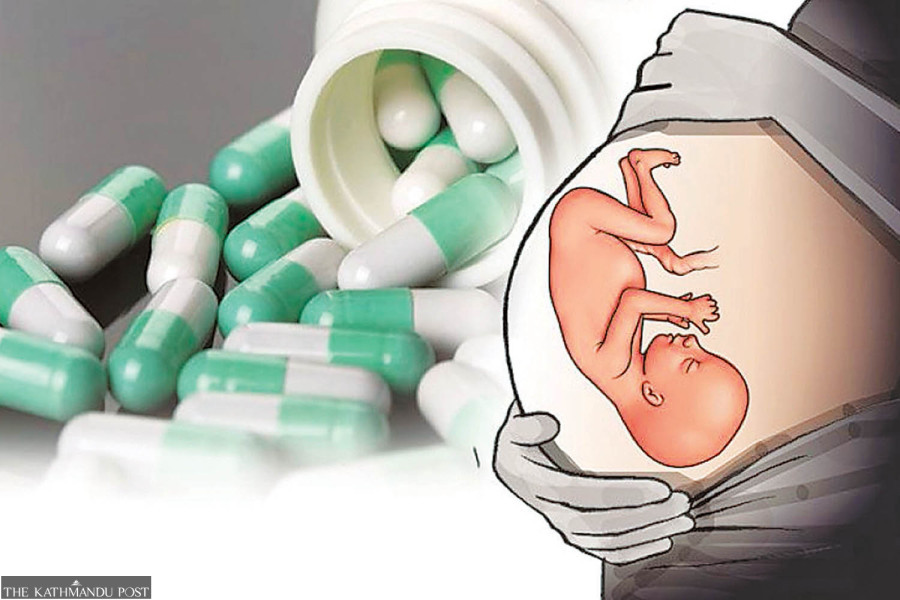Health
Access denied: Unsafe abortion continues despite legalisation 22 years ago
Ten percent of women are denied abortion services, and 42 percent with pregnancies beyond 10 weeks are turned away, new report says.
Arjun Poudel
Although abortion was legalised in Nepal in 2002, unsafe abortions are still rampant in many places throughout the country, and women are denied services, a new report shows.
According to the report prepared by Center for Research on Environment Health and Population Activities (CREHPA), and the University of California, San Francisco (UCSF), one in 10 women seeking abortions at health facilities was denied care.
Moreover, four in 10 women (42 percent) with more than 10 weeks of pregnancy or who were unaware of their gestational age were denied an abortion.
“The most common reason for denial was advanced gestation age, with over 80 percent of denials attributed to this factor,” reads the report. “Denial doesn’t stop abortion; it drives women to seek alternatives. Sixty percent of women who were denied services by authorised health facilities attempted to end their pregnancies elsewhere.”
Nepal legalised abortion in 2002, marking a milestone for women’s reproductive rights, their empowerment, and bodily autonomy. With legalisation, persecution and jail terms for women who terminated unwanted pregnancies ended, and unsafe abortions decreased significantly.
However, the new report shows a vast gap in services, which forced women to opt for alternatives, including unsafe means.
“Thirty-eight percent of women who were denied services turned to unsafe/unapproved sites for subsequent abortions,” the report stated. “Seventy-three percent of women who were denied abortion services were, in fact, legally eligible for abortion.”
Access to abortion services varied based on women’s characteristics. Those under the age of 25 years, unmarried, childless, not working outside the home, of lower wealth, or seeking abortion solely for sex selection were more likely to be denied abortion.
Additionally, women who were unaware of the legal status of abortion services also experienced higher rates of denial.
The study was carried out on 1,841 women seeking abortion services from 22 government-approved health facilities in all seven provinces, including major cities—Kathmandu Valley, Pokhara, Chitwan, Butwal, Nepalgunj Kailali, Kanchanpur, Biratnagar, Jhapa among others.
‘This study shows that progressive abortion laws alone are not enough to guarantee access to safe abortion for all women,” said Dr Mahesh Puri, principal investigator of the study. “Young women, those with lower educational backgrounds, and women from marginalised groups (such as the Dalit) are disproportionately affected by denials, perpetuating cycles of poverty and poor health.”
Women who were denied abortion care reported substantial economic hardship, with increased rates of inadequate household income and lower labour force participation over the period of three years, according to the report.
Women who are unable to receive abortion services were also less likely to achieve their personal goals. While 42 percent of women who received an abortion achieved education goals, only 31 percent of denied women did so. Similar disparities were seen in employment (54 percent vs 45 percent), child-related goals (65 percent vs 31 percent), and financial goals (66 percent vs 50 percent).
Denying abortion care doesn’t only affect women; it has lasting consequences for the health of their children, according to the report.
The report highlights the urgent need for targeted policies to bridge the gap between Nepal’s legal framework and the reality of service accessibility.
“Ensuring that abortion services are universally accessible and affordable can help reduce economic and health disparities among Nepalese women and contribute to better outcomes for children,” reads the report.
Experts say unsafe abortion is among the leading factors of maternal deaths.
The study does not say anything about maternal deaths from unsafe abortions. Still, the latest census report by the National Statistics Office shows that of the total maternal deaths, six percent (37 women) had undergone abortions or suffered a miscarriage..
It is estimated that over 300,000 abortions are performed in Nepal in a year. However, the government data show only around 100,000 abortions are performed in a year at authorised health facilities. Experts say many abortion take place in unauthorised places too, which does not come into the government’s record.




 18.12°C Kathmandu
18.12°C Kathmandu















